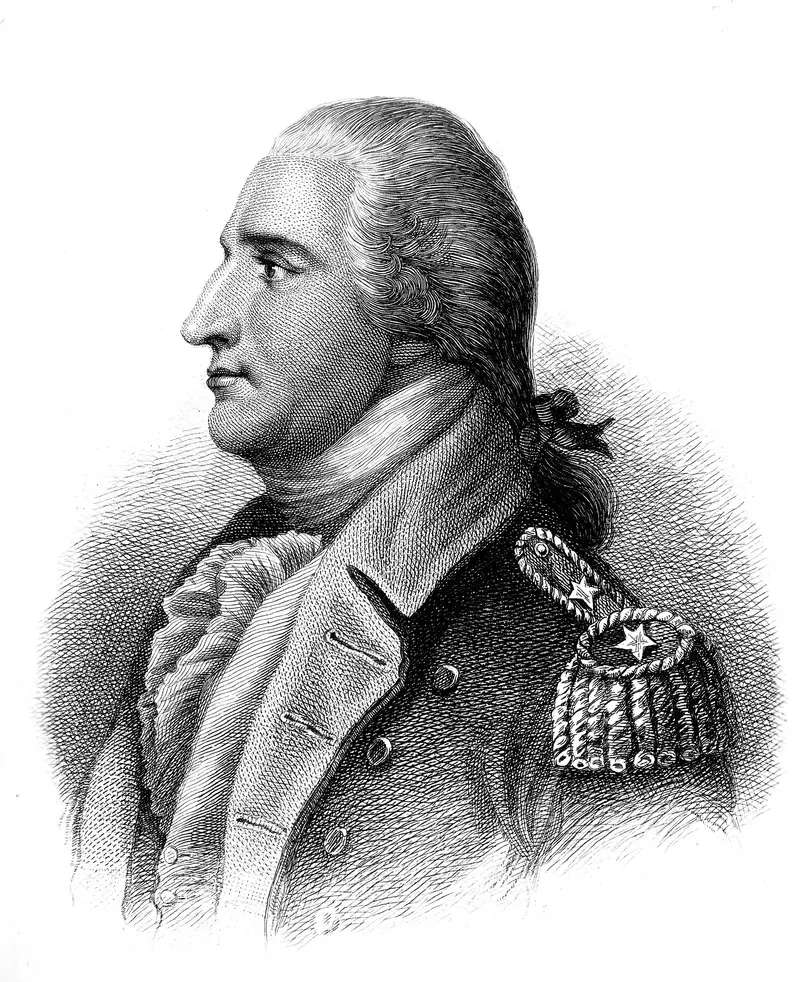Benedict Arnold
Today, the name “Benedict Arnold” is associated with being a traitor. However, for much of his life, Arnold supported the efforts of the colonies even to the point of being a Revolutionary War General.
It wasn’t until circumstances presented themselves that he couldn’t agree with that he decided to change sides from supporting the colonies to supporting the British.

Benedicts Early Life
Benedict was born in Norwich, Connecticut in 1741. He was the son of a successful businessman, and all but one of his five brothers and sisters died from yellow fever.
Add to this that his father was an alcoholic and drank away all of their fortunes, and it threw Benedict into a bad situation.
When things were going well, Benedict attended a private school, but when they lost all of their money, he was forced to quit and became an apothecary apprentice.
His mother then passed away in 1759, and his father died two years later.
Becoming a Business Man
In those days, it was challenging to be a successful merchant, and Benedict made efforts as both a bookseller and an apothecary.
He had some success and expanded to invest with a partner in a trading company. However, the British imposed the Stamp Act on all of the colonies, and this caused many to lose a lot.
It was during this time that Patrick join the Sons of Liberty to organize ways to fight back.
Revolutionary War
As anger arose in the colonies, the Revolutionary War broke out, and Benedict Arnold was given the position of the Connecticut militia captain.
Arnold bravely led militia troops north after the Battle of Lexington and Concord so that they could fight against the British taking over Boston. He was given a commission of colonel so that he could attack Fort Ticonderoga.
He coordinated with the Green Mountain Boys and Ethan Allen, and they succeeded in taking Ticonderoga. It is considered to be the first victory for the colonies.
Arnold considered himself a patriot and continued this philosophy as he joined George Washington’s Continental Army.
He held the commission of colonel and led the Quebec City attack. Arnold ended up with a leg wound, and even though the colonists lost the battle, he was promoted to Brigadier General.
Although the title of Brigadier General is a good one, Arnold was upset because he wasn’t promoted to Major General.
It made him so mad that he tried to resign, but George Washington knew he was right and refused his resignation.
Not long after that, Benedict Arnold was given the commission of Major General.
American Hero
Believe it or not, at one point, Arnold was considered to be an American hero.
He led the attack at the Battle of Saratoga against the British, where he ended up with a second leg wound.
He was received with a hero’s welcome when he returned to Valley Forge, Pennsylvania.
To some, he wasn’t a hero
Like many in higher-ranking military positions, Arnold made enemies along the way in both Congress and the Continental Army.
Some accused him of using his position to profit for himself as well as being greedy.
Others just didn’t like him. There were so many complaints that Benedict came under scrutiny for a military court-martial.
Switching Sides
At one point in 1779, Arnold decided to switch sides, and he began to sell secrets to the British spy chief Major Andre.
Benedict’s wife, Peggy, was the go-between to get letters to Andre that was written in invisible ink and code.
The kind of information that Arnold was passing was high level, including troop movements, locations for supplies, and even the troop count.
Meanwhile, Arnold was given the position of commander at the West Point fort. It was then that Arnold decided to surrender the fort for 20,000 British pounds.
By a fluke of luck, the surrender failed when Andre was captured, and they found Arnold’s papers indicating the surrender and deal.
Once Arnold got wind of Andres capture, he escaped and headed for the British.
Part of Benedict Arnold’s plans had involved slowly lowering the fort defenses so that it would be easier for the British to take over.
Benedict met with Andre and the covered their plans for surrender, writing them down on paper. As fate would have it, just a few days later the Americans captured Arnold and were able to see the plans that Arnold and Andre had made for handing over West Point to the British.
Once Arnold found out about the capture of Major Andre, he heading to the British outpost.
Turncoat
Benedict Arnold became what is known as a “turncoat” and was rewarded with the commission of General.
Arnold then led attacks against the colonists in New London and Richmond.
When the war ended, Arnold relocated to England, where he became a merchant with the West Indies.
His reputation was well-known, so when he tried to move to Canada, he was met with a mob that burned an effigy at his house, and he moved back to London where he died.
Facts about Benedict Arnold
- He was born on January 14, 1741, in Norwich, Connecticut
- His father was a wealthy landowner
- Arnold was a successful merchant
- Arnold made many enemies within the Continental Army and Congress
- In 1779, Arnold began to sell secrets to the British
- Benedict Arnold considered one of the biggest traitors in the history of the US.
- Died: June 14, 1801, in London, England
What did you learn?
What two trades did Benedict Arnold try early in his life?
Apothecary and bookseller
What battle did Arnold lead that made others consider him an American hero?
Battle of Saratoga
What was the first military position held by Benedict Arnold?
Captain of the Connecticut militia
Who did Benedict Arnold use to pass secrets to the British?
His wife Peggy
What place was Arnold going to sell to the British for 20,000 pounds?
Fort at West Point
What happened when Arnold tried to move to Canada?
A mob burned an effigy at his home




